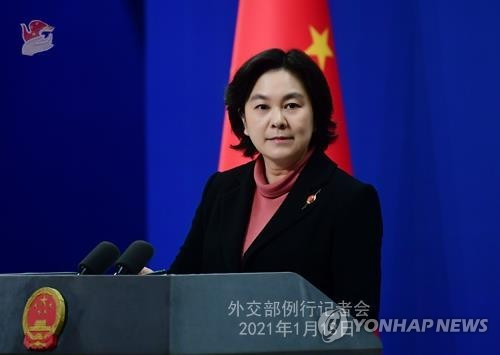Hong Kong media “Criticism and ridicule of netizens has led to…
China also blocked the latest topic’Club House’…connected with netizen VPN
 viewer
viewer
A spokesman for the Ministry of Foreign Affairs of China said, “Why can’t Chinese people use Twitter and Facebook?” and was subject to criticism and ridicule, Hong Kong’s Bean Fruit Daily reported on the 21st. .
The Bin Fruit Daily reported that Chinese Foreign Ministry spokesman Hwa Chun-ying made the remarks at a recent regular briefing while refuting reports from the US Associated Press.
On the 15th, the Associated Press conducted a survey of social network services (SNS) such as Twitter, Facebook, YouTube, and Telegram with the Think Tank Atlantic Council, and as a result of spreading conspiracy theories and false information about the novel coronavirus infection (Corona 19). The United States, China, Russia, and Iran reported that they made the biggest’actives’.
The Associated Press pointed out that influential officials in these four countries and pro-government-oriented media were’super spreaders’ who amplified the conspiracy theory to spread fake information related to Corona 19 and use it politically. It also argued that among the four countries, China was the leader in distributing conspiracy theories and false information about the origin of Corona 19. He reported that since mid-2019, Chinese diplomats’ Facebook accounts have doubled, and Twitter accounts have tripled.
A spokesman for Hua refuted the report and pointed out to the Associated Press whether it has investigated how much diplomats and media from other countries are using Chinese social media. “Why foreigners can use Chinese social media, but Chinese can’t use Twitter and Facebook?” he asked.
China has completely blocked Facebook and Twitter access after a bloodshed protest in Urumqi, Xinjiang Uighur Autonomous Region in 2009. A spokesman for Hwa made a false remark against this fact.
The Binfruit Daily reported that Chinese netizens were surprised at the remarks, and critical comments such as “Yeah, I want to know why Chinese people can’t use Twitter and Facebook.” Also, from the cynical writing, “The Communist Party and the state (China) are trying to protect people from the invasion of Western culture. Why don’t you understand?” He added that some pointed out that it is doubtful whether it is correct.
The Bin Fruit Daily reported that Hwa spokesman’s remarks were not included in the official remarks posted on the Ministry of Foreign Affairs website.
China is blocking most Internet channels that may introduce’external information’ that is unfavorable to the country, such as Facebook, Twitter, Instagram, YouTube, Netflix, Wikipedia, and major foreign Internet sites. The same is true of the voice-based social media’Club House’, which has recently gained great popularity worldwide.
However, even after the 8th when China blocked access to the clubhouse, many Chinese users are actively interacting with users from other regions at the clubhouse, the Taiwanese Central News Agency said. Although the authorities blocked the clubhouse with’The Great Firewall’, many Chinese users are still entering the clubhouse using a virtual private network (VPN) that helps bypass access. The central news agency said, “In addition to political topics, many Chinese users open rooms and discuss topics related to life with Taiwanese users.”
A Chinese user even created a room to teach Taiwanese people the Beijing-style pronunciation of ‘Erhua.’ Although there are some differences in intonation and expression, etc., the Chinese and Taiwanese at the clubhouse are actively interacting in such various chat rooms because of the basic communication.
The deterioration of bilateral relations (China and Taiwan) and the spread of Corona 19 have greatly reduced human exchange between China and Taiwan, but the clubhouse acts as a bridge between the two sides. Recently, a room called’Bangan Youth Debate’ was opened in the clubhouse, and it was popular among Chinese and Taiwanese users, the central news agency said. The clubhouse discussions dealt from everyday topics to politically sensitive topics such as Xinjiang Uighur camps, Taiwan independence and Hong Kong National Security Law. Wang Xin-shen, director of the Dong-A Research Institute of National Political University of Taiwan, said, “Through the clubhouse, the people of Yangan have learned that the other party is not the propaganda official of the authorities. This exchange cannot be extended to everyone, but it means that exchanges exist. “There is.”
/ Reporter Kihyuk Kim [email protected]
< 저작권자 ⓒ 서울경제, 무단 전재 및 재배포 금지 >
